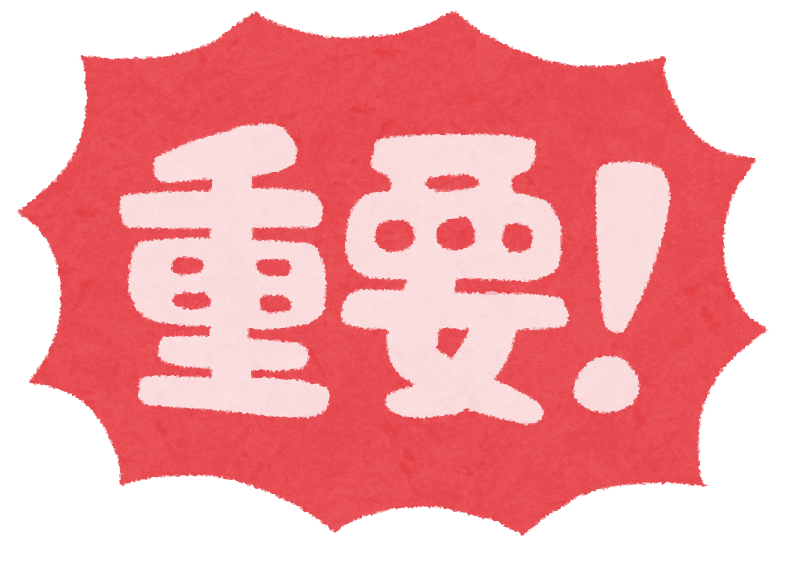8月上旬、日本では災害級の暑さとなり、群馬県で国内歴代最高の
で41.8度を記録しました。夏に日本へ来てはいけません(汗)
SNSでその話題をした時に「夏がきらいですよ!!!」との
日本語のコメントをいただきました。ありがとうございます♪
意味も分かるし、文法の間違いもナシ!対面の会話だったら
スルーしますね。ただ、見た瞬間に感じる違和感。。。
ここは「夏はきらいですよ」というのが自然だからです
「は」と「が」の使い分けって、学習者さんには難しいようですね
ま、その分私たちも英語の学習では前置詞(inとか ofとか)には
苦しめられてるんでお互い様です。
そこで今回はこの2つのどちらかを、直感的に選べる
ようになれるよう説明できたらと思います

サクッと言うと、
AはBです 言いたいことはB 「は」の後が重要
AがBです 言いたいことはA 「が」の前が重要
「夏が嫌い」だと言いたいことは夏、となります
春でも秋でも冬でもなく、夏!と言いたい感じかな
「嫌いな季節ってある?」と聞かれた答えならOKですね
「夏は嫌い」だと「嫌い」が言いたいことだと分かります
暑いのは「嫌い」という相手の知らない新情報を伝えたかったと
思うので「嫌い」の前は「は」がふさわしいんですね
。。。コメントくださった方、説明の例に使わせていただいたこと
ここでお礼申し上げます♪学習者さんたちの日本語の文は
こちらにとっても気づきになります

このルールは疑問詞のある文でもちゃんと見られます
何、誰、いつ、どこ、どっち。。。などは
知りたいと思うからこそ使うのであって、ここが重要ですよね
私のスイカを食べたのは誰ですか? ←疑問詞は「は」の後
誰が私のスイカを食べたんですか? ←疑問詞は「が」の前
花火大会はいつですか? ←疑問詞は「は」の後
いつが花火大会ですか? ←疑問詞は「が」の前
大まかですが、使い分けを理解していただけたでしょうか
ちなみに、もちろんこれもテキストで学ぶような、基本の
丁寧な言い回しです。日常会話なら
「夏、きら〜い!」
「誰よ!アタシのスイカ食べたのー?!」
「花火大会、いつ?」
。。。と、「は」と「が」なんか使わなかったりします♪
In early August, Japan was hit by disaster-level heat, with Gunma Prefecture recording a domestic all-time high of 41.8°C. (Seriously, don’t come to Japan in the summer 😅)
When I mentioned this on social media, I even received a comment in Japanese saying, “夏がきらいですよ!!!” (“I hate summer!!!”). Thank you for that! ♪
The meaning is clear, and there’s no grammar mistake! If this were a face-to-face conversation, I would just let it pass. But the moment I saw it, I felt something was a little off… In this case, saying “夏はきらいですよ” (I don’t like summer) would sound more natural in Japanese.
It seems that many learners struggle with the difference between “は” and “が.”
Well, to be fair, we Japanese learners also suffer a lot with English prepositions like in or of, so it’s mutual!
This time, I’d like to explain these two particles in a way that helps you choose between them more intuitively.
To put it simply:
- A は B です → What you want to emphasize is B. The part after “は” is important.
- A が B です → What you want to emphasize is A. The part before “が” is important.
So when you say 「夏が嫌い」 (I dislike summer), what you really want to emphasize is summer. It feels like saying, “Not spring, not autumn, not winter — it’s summer!” That’s why it works well as an answer to the question “Is there a season you dislike?”
On the other hand, if you say 「夏は嫌い」 (As for summer, I dislike it), the focus is on dislike. You’re giving the listener new information: “I dislike the heat.” That’s why the particle “は” fits better here.
Lastly, I’d like to thank the person who left that comment, which I used here as an example for explanation. The Japanese sentences written by learners always give me new insights as well.
This rule also shows up clearly in questions with interrogatives.
Words like what, who, when, where, and which are used because the speaker wants to know that specific piece of information — that’s the important part.
私のスイカを食べたのは誰ですか? → Who was it that ate my watermelon? (the focus is on 誰)
誰が私のスイカを食べたんですか? → Who ate my watermelon? (the focus is still on 誰)
花火大会はいつですか? → When is the fireworks festival? (the focus is on いつ)
いつが花火大会ですか? → When is it that the fireworks festival takes place? (again, emphasizing いつ)
Roughly speaking, I hope this gives you a basic understanding of how to use は and が.
Of course, these are the polite expressions you’d typically learn in textbooks. In everyday conversation, people often don’t even use は or が:
• 「夏、きら〜い!」 → “I hate summer!”
• 「誰よ!アタシのスイカ食べたのー?!」 → “Who ate my watermelon?!”
• 「花火大会、いつ?」 → “When’s the fireworks festival?”


